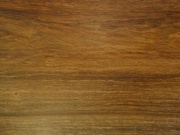Difference between revisions of "Lignum vitae"
Jump to navigation
Jump to search
(username removed) |
|||
| (3 intermediate revisions by 2 users not shown) | |||
| Line 6: | Line 6: | ||
== Synonyms and Related Terms == | == Synonyms and Related Terms == | ||
| − | wood of life; ''Guaiacum officinale; Guaiacum sanctum''; | + | wood of life; ''Guaiacum officinale; Guaiacum sanctum''; gaïac (Fr.); gaiaco (Port.) |
| − | + | ==Physical and Chemical Properties== | |
| − | |||
| − | |||
| − | |||
| − | |||
| − | = | + | * Heartwood color ranges from olive to dark green/brown to nearly black; color darkens with age and light |
| + | * Grain is interlocked; Texture is fine and can be polished to a high luster | ||
| + | * Durable for outdoor use: resistant to insect attack | ||
| + | * Density = 73-83 ppcf | ||
| − | * | + | ==Working Properties== |
| + | * Can skip over-top jointer cutters on account of its extremely high density, and very light passes are recommended. | ||
| + | * Will also dull cutters, and overall the wood is considered quite difficult to work. | ||
| + | * Due to its high oil content, it’s very difficult to get strong and reliable glue joints. Finishing can also be problematic as well. | ||
| + | * However, lignum vitae turns well on a lathe. | ||
| − | * | + | ==Resources and Citations== |
| + | * The Wood Database: [https://www.wood-database.com/lignum-vitae/ Lignum vitae] | ||
| − | * | + | * G.S.Brady, ''Materials Handbook'', McGraw-Hill Book Co., New York, 1971 Comment: p. 451 |
| + | |||
| + | * Ralph Mayer, ''A Dictionary of Art Terms and Techniques'', Harper and Row Publishers, New York, 1969 (also 1945 printing) | ||
| + | |||
| + | * F. H. Titmuss, ''Commercial Timbers of the World'', The Technical Press Ltd., London, 1965 Comment: 73-80 ppcf | ||
* ''The Merck Index'', Martha Windholz (ed.), Merck Research Labs, Rahway NJ, 10th edition, 1983 Comment: entry 5512 | * ''The Merck Index'', Martha Windholz (ed.), Merck Research Labs, Rahway NJ, 10th edition, 1983 Comment: entry 5512 | ||
| Line 26: | Line 34: | ||
* ''Van Nostrand's Scientific Encyclopedia'', Douglas M. Considine (ed.), Van Nostrand Reinhold, New York, 1976 | * ''Van Nostrand's Scientific Encyclopedia'', Douglas M. Considine (ed.), Van Nostrand Reinhold, New York, 1976 | ||
| − | * | + | * Random House, ''Webster's Encyclopedic Unabridged Dictionary of the English Language'', Grammercy Book, New York, 1997 |
* ''CRC Handbook of Chemistry and Physics'', Robert Weast (ed.), CRC Press, Boca Raton, Florida, v. 61, 1980 Comment: density=73-83 ppcf (1.17-1.33 g/cm3) | * ''CRC Handbook of Chemistry and Physics'', Robert Weast (ed.), CRC Press, Boca Raton, Florida, v. 61, 1980 Comment: density=73-83 ppcf (1.17-1.33 g/cm3) | ||
Latest revision as of 13:49, 7 October 2022
Description
The dense, heavy heartwood of the tropical evergreen guayacum trees, Guaiacum officinale and Guaiacum sanctum, that are native to the West Indies and the coast of Central America. Lignum vitae is the heaviest of all woods. The dark brown to black wood is tough and difficult to carve, but it is valued for its fine grain that polishes to a high gloss. The principal use of lignum vitae is for making of bowling balls, pulley sheaves, and mallet heads. It is naturally resistant to fungi.
Synonyms and Related Terms
wood of life; Guaiacum officinale; Guaiacum sanctum; gaïac (Fr.); gaiaco (Port.)
Physical and Chemical Properties
- Heartwood color ranges from olive to dark green/brown to nearly black; color darkens with age and light
- Grain is interlocked; Texture is fine and can be polished to a high luster
- Durable for outdoor use: resistant to insect attack
- Density = 73-83 ppcf
Working Properties
- Can skip over-top jointer cutters on account of its extremely high density, and very light passes are recommended.
- Will also dull cutters, and overall the wood is considered quite difficult to work.
- Due to its high oil content, it’s very difficult to get strong and reliable glue joints. Finishing can also be problematic as well.
- However, lignum vitae turns well on a lathe.
Resources and Citations
- The Wood Database: Lignum vitae
- G.S.Brady, Materials Handbook, McGraw-Hill Book Co., New York, 1971 Comment: p. 451
- Ralph Mayer, A Dictionary of Art Terms and Techniques, Harper and Row Publishers, New York, 1969 (also 1945 printing)
- F. H. Titmuss, Commercial Timbers of the World, The Technical Press Ltd., London, 1965 Comment: 73-80 ppcf
- The Merck Index, Martha Windholz (ed.), Merck Research Labs, Rahway NJ, 10th edition, 1983 Comment: entry 5512
- Van Nostrand's Scientific Encyclopedia, Douglas M. Considine (ed.), Van Nostrand Reinhold, New York, 1976
- Random House, Webster's Encyclopedic Unabridged Dictionary of the English Language, Grammercy Book, New York, 1997
- CRC Handbook of Chemistry and Physics, Robert Weast (ed.), CRC Press, Boca Raton, Florida, v. 61, 1980 Comment: density=73-83 ppcf (1.17-1.33 g/cm3)
